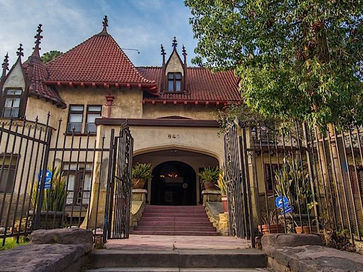
ABOUT

OUR MISSION.

CHAYNGE's mission is to empower recently arrived, at-risk, and low-income immigrant youth in our community by providing them with access to arts and cultural programs, as well as essential social and legal services. We strive to create a safe and supportive environment where young people can develop their skills, explore their creativity, and build meaningful connections with others. Our vision is to help these youth achieve their full potential and become active engaged members of their community. Through our programs and services, we aim to make a lasting impact on the lives of young people in our community and contribute to a brighter, more inclusive future for all.
OUR FOUNDING.
The CHAYNGE program, formerly known as Casa Libre, was established by the Center for Human Rights and Constitutional Law (CHRCL) in 1996. Its original purpose was to provide temporary housing, as well as legal and social services, to unaccompanied immigrant minors detained by the federal government.
In 1997, the Center for Human Rights and Constitutional Law (CHRCL) reached a historic nationwide settlement with the government in the class action case of Flores v. Garland. The settlement sets the national standards for the conditions in which detained immigrant minors must be housed and requires their prompt release to close family members residing in the United States.
However, the government was sometimes slow to release minors or did not approve of their placement with relatives. As a result, CHRCL established a program that provided these minors with transitional shelter while helping them to obtain legal status. Successful work on the Flores case by CHRCL lead attorneys Peter Schey and Carlos Holguin resulted in the more thorough vetting of family by the government and the more prompt release of minors, reducing the need for Casa Libre to serve as a temporary shelter for released minors. In addition, because the released Casa Libre residents were under 18, the program could not serve at-risk or recently arrived immigrant youth living in the neighborhood because anyone entering the home had to have a background check. In 2023 we therefore decided to repurpose the program to focus on providing a larger population of at-risk and recently arrived immigrant youth with a range of arts and music programs while continuing to also provide legal and essential social services.
TRANSITION TO EXPAND SERVICES.

CHAYNGE TODAY.

Starting in 2023, our program will provide a comprehensive range of services to the community. These services include case management, creative workshops, educational testing and placement, referrals to no-cost healthcare providers, drug and alcohol prevention programs, family reunification services, life skills and leadership workshops, free legal services, and mental health counseling. For more information, please visit our services page.
THE CHAYNGE CENTER.

The CHAYNGE property is a historic mansion purchased by the Center for Human Rights and Constitutional Law in 1996.
This 10,000-square-foot Gothic mansion, built in 1901, is registered as a county, state, and federal historic site. The home was designed by renowned architect John Parkinson, who also designed the Los Angeles Coliseum, Los Angeles City Hall, and Union Station. The house features vaulted ceilings and curved walls throughout, making it an architectural masterpiece. Its Gothic construction is characterized by lightness and soaring spaces.
CHAYNGE is located in the Pico Union district of Los Angeles, near many non-profit organizations providing community-based social services. The property was renovated after being purchased, with updated plumbing, electrical systems, ADA compliance, and a fire-alarm system added.
Lush gardens surround the house and the exterior grounds are maintained by volunteers. Weekly gardening projects are organized to cultivate bulbs, plants, and maintain the gardens.

BOARD OF DIRECTORS.
Zerihoun Yilma Associate Director at CHIRLA, with 20 years of experience in both for-profit and non-profit management. His experience in the private sector has shaped his unique expertise for the non-profit sector.
Gabriel F. Merino Formerly detained minor who was separated from his mother when apprehended by the US Border Patrol. He is a current resident at Casa Libre, attending school and planning to eventually attend college.
Rev. Jennifer Gutierrez An ordained United Methodist minister who has served as Pastor in several Los Angeles churches. She was Director of Urban Ministry for the Cal-Pac conference of the UMC and most recently served as Executive Director of the Museum of Social Justice in Los Angeles. Rev. Jennifer also has a Master of Divinity from Claremont School of Theology and is currently working on her Doctorate of Ministry, also from Claremont.
Alex Sanchez An internationally recognized peacemaker and co-founder of Homies Unidos in Los Angeles. He has developed and implemented innovative violence prevention and intervention programs since 1998 and has also led the organization as Executive Director since 2006.
Peter Schey, Esq. Board President and longtime advocate and lawyer representing thousands of detained unaccompanied minors in federal custody.
Father Richard Estrada Founder and President of Jovenes Inc., a housing program focused on immigrant youth aged 18 and older.
Harry Salzberg, Esq. Immigrant Rights Attorney specializing in winning lawful status for immigrant minors and youth.
Paule Cruz Takash Nationally recognized advocate and expert on groundbreaking city and county programs to issue identification cards to immigrants and homeless communities.
Richard Ashbee Former immigrant and entrepreneur dedicated to addressing the unique challenges of immigrant minors.
Jocelyn Duarte, M.A. Citizenship Services and Civic Engagement Programs Manager at SALEF, and a teacher at East Los Angeles Community College in the Chicana/o Studies Department.
Joseph Chicas, MSW Adjunct Professor at USC, teaching policy advocacy and social change. He has 10 years of leadership experience in both the public and private sectors, rooted in a commitment to solving society's most vexing issues, including Veterans affairs and homelessness.












